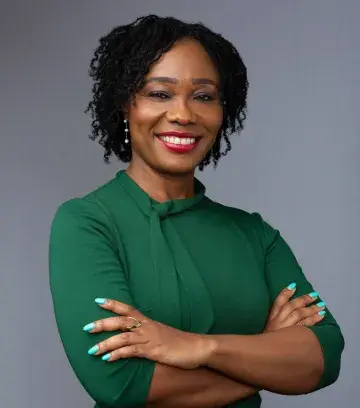If There's Life, There's Hope

Weayonnoh Nelson-Davies’ journey from civil war to statehouse advocate, RWU Law Class of 2007
Juris DoctorOne thing you’ll notice when you meet Weayonnoh Nelson-Davies L’07 is her resonant voice. Throughout her life, she has used that voice to advocate for justice.
In 2022, Nelson-Davies became the Executive Director of nonprofit Economic Progress Institute (EPI). She now uses her voice to advocate for policy change for low- and modest-income Rhode Islanders. But her journey of speaking up for others begins decades ago on another continent.
Growing up in wartime
Nelson-Davies was ten years old when the civil war began in her native Liberia. Before the war, she lived a comfortable life as a middle-class school child. The war changed everything.
“The war hit, and there's deep poverty. For the first time, there's a threat of being killed every single day, there’s quickly growing up,” Nelson-Davies recalls. “I realized this is what death looked like. You may not make it out of here. It's very dramatic, obviously, but I think there was something in the war that brought this zeal to fight that I never had before.”
The war gave Nelson-Davies a firsthand look at extreme injustice and the impact on innocent citizens. But despite the suffering she witnessed, the war was a catalyst for a new direction in her life. “It changed my life for the worse and for the better,” she reflects.
Nelson-Davies used to remind herself, “If there's life, there’s hope. I always said, ‘If I am to survive this war, I do not just get to enjoy life quietly.’”
“I started getting the desire to use my voice, very deep voice, my father, my brothers, all of them have it. I had it as a little girl,” Nelson-Davies says. She didn’t like her own voice until she began using it in debates and skits drawing attention to the plight of the child soldiers who were forced to fight for the warring factions.
Becoming a fighter for justice.jpg)
Even before Nelson-Davies immigrated to the United States at the age of 16, the seed had been planted in her mind to become a lawyer, fighting injustice like her hero Nelson Mandela. As an immigrant with temporary status at the time, though, she faced significant obstacles to realizing that dream, including difficulty securing loans.
Nelson-Davies earned her undergraduate degree in psychology from Rhode Island College. She was accepted to law schools around the country and chose Roger Williams University School of Law because she was living in the state and appreciated its public interest focus. She also received a scholarship, which felt like, “Roger Williams actually said your dream is about to come true” .
During law school, Nelson-Davies participated in activities that fit her interest in advocating for justice, like trial advocacy, which she says reminded her of her desire to use her naturally powerful voice. While law school reinforced her original motivations to become a lawyer, she also learned that she enjoyed analytical courses like contracts and commercial law.
Nelson-Davies worked at legal aid organizations for fourteen years after law school, doing a combination of direct client representation and working toward systemic change. She was part of her office’s medical-legal partnership, working with healthcare providers to recognize and address circumstances like housing insecurity that contribute to adverse health outcomes.
Living her dream
During the pandemic, Nelson-Davies began to consider her next steps. She was looking for a new challenge that could help her to promote education and systemic change. According to Nelson-Davies, the EPI uses research and data to advocate for low- and middle-income Rhode Islanders. “I feel like I'm living my dream,” she says, “advocating, just in the statehouse versus the courthouse now.”
“Part of the mission is … to make sure that when we create policies in the state of Rhode Island, we're not forgetting certain communities, those communities that cannot afford corporate lobbyists, that cannot afford access to our leaders,” says Nelson-Davies. One of her priorities is on the state budget and how funds are used. The law student with an analytical mind has turned into an advocate who uses numbers to tell the stories of her constituents.
When asked her advice for law students who want to follow a similar path, Nelson-Davies quotes Oprah Winfrey: “I’m not living the dream because I’m special, but I was obedient to the call of the dream.”
Today, that girl who found hope in the simple act of living is sharing her dream with the people she serves.
